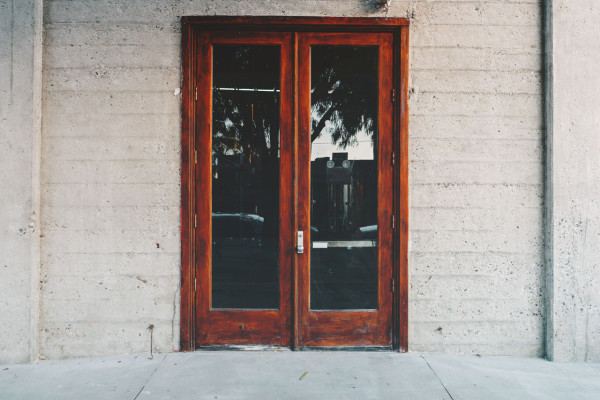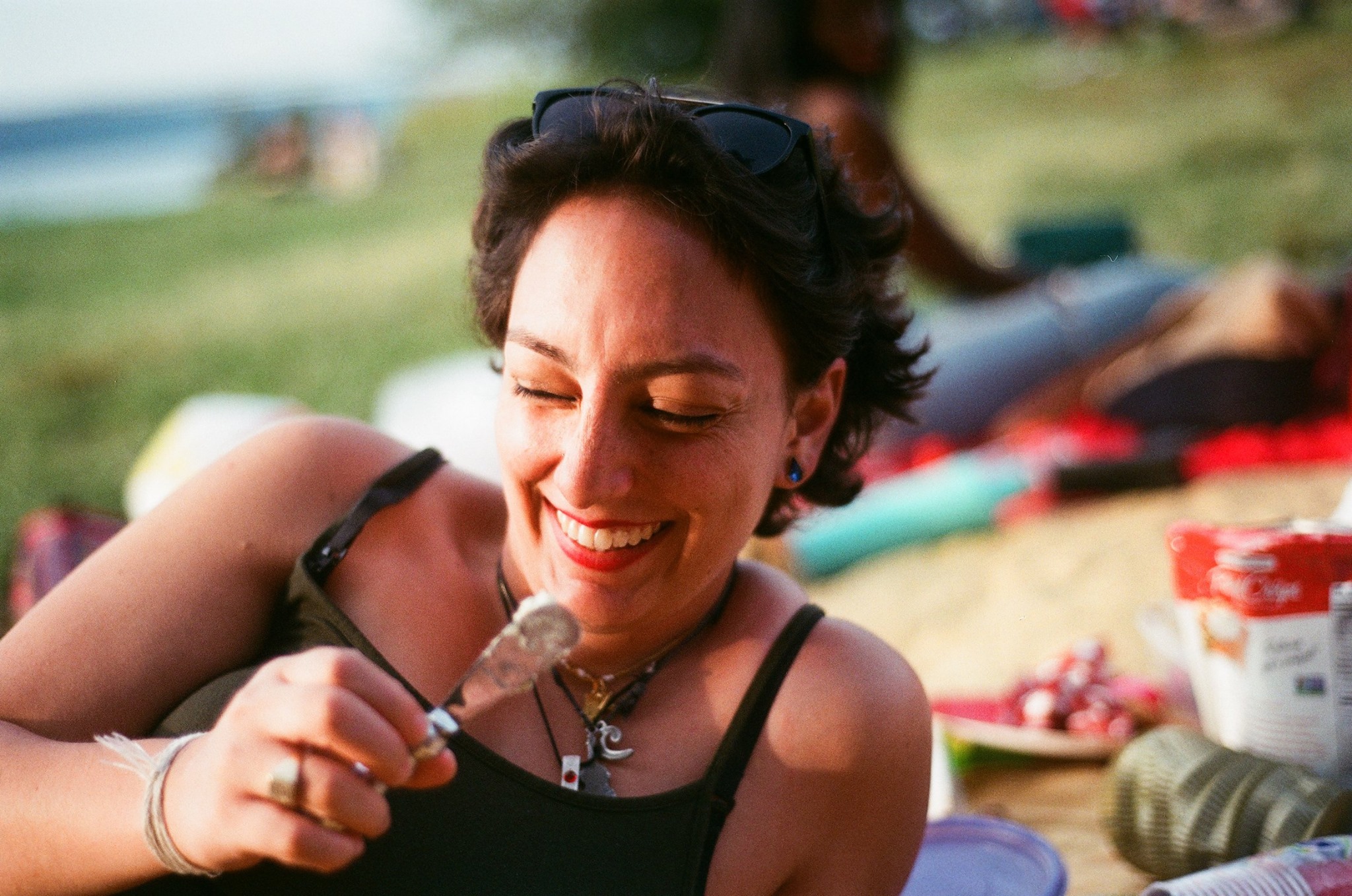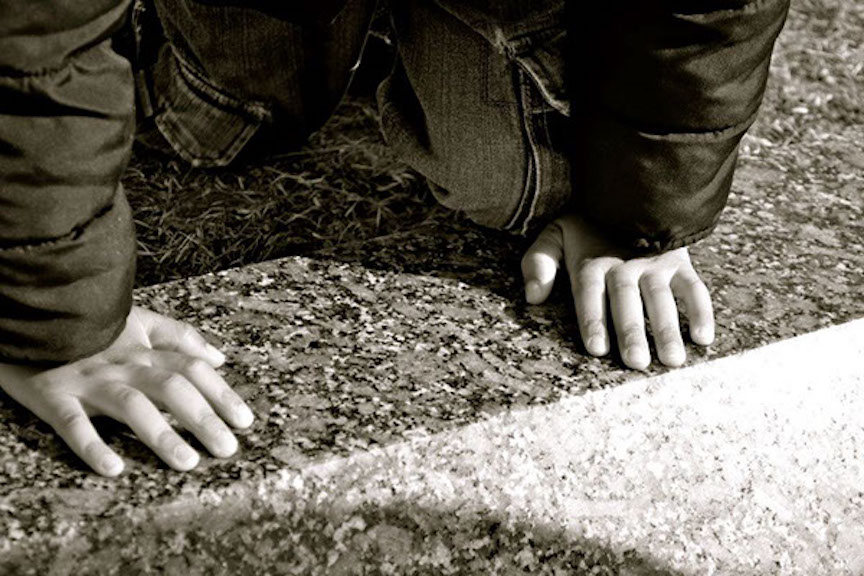Ma told us to kneel so Ba’s soul wouldn’t hurt. Without questioning, the three of us sank to our knees. Leaving the body can take up to 24 hours and it will be painful, the bhikkhuni had instructed before my mom donated money we didn’t have to the temple. The last thing we wanted was for him to feel more pain.
After Ba’s chest stopped heaving, Ma had rushed us all into the bedroom and stacked his unused diapers in front of us, one pile for each knee. Gui, she said. We kneeled. She told us to follow a small black recorder that chanted sounds I couldn’t understand. But I could feel things falling apart, trying to get back in order, and falling apart again.
“I have to call the…” I couldn’t think of the Mandarin word for “hospice.”
“They can wait,” Ma said without waiting.
“There are rules.”
“Tell them they can’t touch him for a day.”
“They have to. The nurse has to declare him dead.”
“Why do you speak for them? Speak for your family.”
I dialed Creekside Hospice, translating Ma’s questions to the woman on the phone, and the woman on the phone’s answers to Ma. After half an hour of exchanges, the woman still said what she had said from the start: She had to send someone down to pronounce my father dead.
I translated to my mother, biting back a “You see” when I saw her fierce eyes fade in submission to laws she had lived under for more than twenty years but never really understood.
At first the voices of my brother, sister, and I were weak and embarrassed, afraid to overtake the sounds from the recorder. But after Ama’s sobs grew into chokes that couldn’t bring her son back, we sang as if the mere repetition of chants could make us believe.
“Alvin saw something really tall walk across the hall,” my sister said, breaking the rhythm.
Ma’s back straightened. “Na li?”
“Toward my room,” my brother said, afraid to ask why.
Ma continued to follow the recorder, as if the exchange never happened.
Later, my sister would tell me what Ma told her. When Ma was a girl, she would stand in the streets of Taiwan and watch parades, and during these parades, there would be a very tall person dressed in black and a very short person dressed in white carrying a fan. She recognized them whenever there was a passing in the family. The tall person would wander near the soul, and if it ever went into anyone’s room it would be a bad omen. “Don’t tell Alvin,” my sister finished. He was always the youngest.
A few weeks later, I would tell him to grow up, to get a job, to do something. I’d land on the same bitter questions I always do: “Why don’t you listen to mom? Why don’t you talk to her?”
“Why don’t you shut up?” He’d slam the door. I’d shut up. There was always this fear that my words would be the final push, and he was already tiptoeing too close to the edge. Open or I break down, Ba used to say, his voice more threatening than his shrinking figure.
I’d stand on the other side of the door, listening to him play on the guitar. It had been the same cycle of songs he played for Ba when they said he was too far gone to be crying from emotions. The tears are just a reaction, they said. It’s just a reaction, I translated.
I didn’t know what time it was but my knees wanted to bend so I could sit and my lips asked for a break I had no right to give. I saw my brother reach over to a tissue box and slip a pen out of his pocket. He used his left hand as a backboard, scribbled something down, and slid the tissue toward my knee.
How much longer?
“You know how long.”
He took the paper back and added more. Things lose significance when they’re repeated.
“Stop.”
He was detached. It was a word I grew to know, a familiar word I often folded, unfolded, and refolded on my tongue. Where’s home? Detached. How’s your father? Detached.
Ba’s jaws were now so stiff and cold that they hung open, his eyes still wide and whitening. Ma said they would close on their own once his soul left peacefully. But the nurse said it was rigor mortis and shutting them naturally would not be possible. I let the foreign phrase settle on my tongue. Rigor mortis. It tasted of rust.
The next day, a white van from the funeral home pulled into our driveway and two men walked out. The one that knocked on our door was more than six feet tall, and he had on a black button up matched with black slacks and a clipboard. Beside him was a man almost three heads shorter wearing a white polo and pushing the gurney.
“Good afternoon, we’re here for,” the tall man glanced at his clipboard, “Mr. Lai.”
“I’m sorry you had to drive back earlier. My mom just didn’t want … She just thought it was important for my dad to travel alone.”
“We understand. Dropping the other person off wasn’t a hassle at all.”
I led them to Ba’s room. Ma was talking to his body, telling him he will be carried away now into a van and down West Charleston, toward Palm Mortuary.
“She said it’s important to let him know,” I tried justifying, searching for a smirk or any hint of skepticism on their pale, rigid faces. But the tall man merely nodded his head and both waited quietly until they had permission from Ma to enter the room.
While they set up Ba, I walked back to the living room where Ama instructed us three kids to kneel on the living room floor, forming a pathway that sent Ba out the front door. Pray your songs, she said in Taiwanese.
“But we don’t remember. We need the recorder,” my brother answered.
My sister started us off.
She always did. After Ba’s death, she would be confined to the cells of excel sheets to help me and Alvin pay for college. “You job good,” Ma would say, “help them start.”
We kneeled in silence until the wheels brought Ba from his room to the kitchen and to the living room. The path should have been lined with relatives bidding him a good and safe journey. But everyone was too far and the dying took too long. So it was just us and Ama and Ba’s little brother, Uncle Latty. Walk good, we said, One road, walk good.
Before they pushed Ba out of the front door, a loud sob broke from Uncle Latty’s throat. I had never seen him cry before. He grabbed the bill of his white and red cap that he always had on, pulling it toward his eyes. The wail from his throat was the most guttural sound, as if the body under the white sheet was a part of him that was ripped out and left to rot.
We followed the van in our own cars. The entire ride, Ma was telling Ba when he would turn, when they would stop, what street they just crossed. My eyes, on the other hand, were glued to the license plate on the van. Palm 14. I wondered how many there were and how often they made their rounds.
Uncle Latty was mostly silent. The only thing he said was halfway through the drive.
“When I was little, he would let me use his motor bike. Father bought him a house down in the village, so whenever I got out of school he would come get me and bring me there. He didn’t know it, but when he was at work, I would take his bike without asking and mess with it.”
“You are a brave man,” Ma answered.
Silence came back with an even louder ache hanging in the air. When we reached the mortuary, the tall man stopped right in front of the metal doors and stepped out.
“We can’t let you go any further.”
We got out of the car and walked toward the back of the van as the shorter man opened the van’s back doors. I did not hear Ma’s words to Ba. My mind was wandering behind the metal doors, wondering how cold it would be in there and how many souls would run back to find their bodies. And how many would be sitting and waiting.
♠♠♠
Everyone lugged an armful of things through the back of the chapel. There were fruits and candy and crackers for the altar, huge self-arranged vases of roses and daisies, a cardboard box filled with gold and silver spirit money folded into the shape of ancient treasures, bags filled with Ba’s glasses and his favorite pen and more clothes to stuff in his coffin. Ma even packed his certificates and trophies awarded for government works I was never quite clear about. All I knew was that Ba was an important man who somehow strengthened the relationship between the Mariana Islands and China.
We’d learn a little more and more about him on Sunday drives to the movies. Once, Ba flipped open a newspaper while Ma was behind the wheel and exclaimed, “Wow! Who is this?” He passed the paper to Alvin, who stared at the paper for a few minutes, then started laughing. The man in the photo being presented with a plaque from the Vice Minister of Foreign affairs of China was Ba. He was the kind of person who would go to a different country with $20 in his pocket and come back with 20 photo albums and 20 lessons for each of us. He was a man who looked into the camera with eyes that said, “I’m offering all I can.”
Ba’s Chinese name is Wenzhang. It meant an article, essay, piece of writing or literary work. He wrote articles when he was younger. Then he owned a restaurant and wrote tickets. Then he owned a notary public and wrote contracts and immigration letters. The first Chinese character he taught me was ren. It meant human. I always thought the word had a lot of heart in it. Then I turned eight and learned a new phrase, renqing. It meant human emotion and had to do with human interactions. Ba had a lot of emotions, but sometimes it was tucked somewhere you couldn’t see, so deep in his bones that other people forget to notice. When I was younger, we all slept in one bedroom because there were too many bodies in the house — his parents’ bodies, siblings’ bodies, their families’ bodies. Ba would never ask for anything in return.
But now, the only bodies on the pews were the paper and metal signs of his accomplishments. Only a few family members would come. Ma attributed it to being so far away from everyone else. I thought of my friend who flew from Seattle to Jakarta to attend the funeral of an uncle she had only seen twice.
Entering the chapel, we saw that Ba’s coffin was already there. We dropped our things on the floor and walked toward the half open casket.
“Is that him?” came my brother’s voice.
“Yes.”
“It’s all scrunched up.”
“ Not ‘it.’ Don’t say ‘it.’ That’s dad.”
“Isn’t he supposed to look at peace?”
Ba’s eyes looked as if they were sewn shut, his gaping mouth now glued together, his entire face pale and stretched horizontally. Whatever peace he had was forced and molded upon his skin. He was a cold body molded to be alive.
“Ting le!” came Ma’s stern voice. We stopped at her command and stood there quietly for a few more seconds until it felt right to turn back to the pile of bags on the floor.
Ma made me roam around to make sure there were no crucifixes showing before the Buddhist monks came.
“Look to see if they have a long table too. This small circle table is not enough,” she said in Mandarin as she slipped on gloves to arrange the piles of clothes and paper spirit money in Ba’s coffin.
Two days ago, Ma and I brought boxes filled with clothes, every article numbered from pajama pants to shorts to slacks, from briefs and boxers to undershirts to socks, from tanks to plain T-shirts to Hawaiian-printed button downs, from slippers to black leather shoes and belts. Everything he could possibly need in the afterlife was placed in their appropriate stacks with typed instructions to the morticians. Included in these instructions were more instructions that asked them to place the proper white and red blankets either under the body or under the head, with the lotus flowers positioned under the body’s feet. With each box loaded onto the counter, the small funeral home’s office grew even smaller and the administrative assistant’s face grew even darker.
“I’m sorry but I don’t know if we can put all of this…”
I was about to translate the assistant’s words for Ma when Ma waved me aside with one brisk motion of her hand and said to the assistant, “You tell me before I can not go in, see husband prepare. Next day, other man say I can but now too late – why no ask before, he say. Monk tell me she do cloth before. Now you tell me I can not?”
The assistant had muttered an, “I’ll see what I can do,” followed immediately by, “Did you bring the check?” My mother dropped her purse loudly on the counter, forcing a loud ziiiip before she rummaged for her checkbook. I knew I should have said something then, said something to right this feeling, but all I did was direct the assistant’s attention to the stapled instructions and thank her for her understanding and ask her to thank the morticians as well, all the while, my mother’s “Why do you speak for them?” rang in my head.
Ma placed the yellow vertical placard with Ba’s name on the altar, a placard that let Ba know he could come here, that we were waiting for him. When she lit the incense, I immediately went to prop the back door open a bit, knowing that the smoke would trigger the fire alarm.
“Meimei, Close the door.”
“But Ma, the alarm will go off.”
“Close it. Ba will walk through the wrong entrance.”
“But the alarm will go off and then everyone would have to leave.”
“I said close it.”
“He’s going to come in anyway.”
Ma walked over to the door and pulled it closed. “Path is different.”
I pushed the door back open. “I said no.”
It was my first time defying her since Ba came home from the ICU. He ran out of his Medicare lifetime reserve and we ran out of direction. So we all did what Ma said. Look for a new hospital, she said. And we looked. Call their CFO. And we called. Call the CFO again. And we called again. Go in person. And we went and sat in waiting rooms until they saw us cry. There were endless voicemails to a dozen places, but we called and kept calling. Because who else would speak on behalf of Ba?
This time Ma did not say anything.
I heard Ma walk back to Ba and looked up to see her lean over and adjust something on him. She remained staring at Ba in the casket. After a while, Ma slowly straightened her shoulders, her hands lightly closing into fists and releasing again to find air; then they clasped behind her back and held onto each other.
I left the open door and walked toward Ma, feeling I had crossed some sort of line but knowing it was meant to be crossed. I could still hear Ba from his TV lounge chair, lightly taking the words from my tongue before I could respond to Ma’s reprimands. “You always say you know Meimei,” he said, “You always say, ‘I know, but.’ But what Meimei, what is it that you know?”
A tremor ran through Ma’s shoulders. Standing beside her, I could sense her body struggle to quiet it. We both had the same question, hovering.
When things got difficult, I was always able to leave.
In the last stages of dying, Ma and Anita were the ones flipping Ba over to clean up the ruthless smell of shit, the kind that stuck to their skins no matter how much they scrubbed. “You stay and finish college,” Ma said. I hung up the phone, relieved.
When the doctor advised me to tell Ma to let him go, I repeated the doctor’s words: “He doesn’t need to suffer.” Decades ago, there was a fortune teller who told Ba that if he defeated a huge obstacle to come, his future would be happy and prosperous. “What if this is the obstacle?” Ma asked. I left the question with her in Nevada and boarded a plane back to California.
“He was always afraid of burning. We can’t cremate him,” Uncle said. “He told me it was okay,” Ma reassured. But when Uncle was out of earshot, she asked me, “What if they blame me? What if his whole family blames me?” I shrugged my shoulders and offered no words.
“Is this what he wanted?” Ma asked as we both looked in the casket at Ba, who would later be burned while Ama screamed for her son to get out, get out of the fire.
I had forgotten about the guilt Ma had kept alive on her shoulders because I was too submerged in mine.
The morning before Ba died, I walked into his room to check on him. His eyes were staring at a point past his toes, his lungs overtaken by a loud, measured machine. But he was still alive. I thought of the number of times I found myself wishing for him to finally die—not only for him but also for us. Every minute he gained was another Ma lost. “Why won’t you end the suffering?” I heard myself say aloud.
When I checked back on him 15 minutes later, his eyes were staring at the doorway I had left earlier, unblinking.
Now our guilt had found each other. Without prompting, Anita and Alvin came over. Our question fell into a silent certainty as we stood in front of Ba.
This time I didn’t leave.
“This is what he wanted.”
In the short time between Ba’s death and his funeral, I had written all the lessons and memories I could remember about him. In a way, I was asking for forgiveness for wanting the easy way out, for reducing him to mere rotting skin and bones. Each time I wrote about him, I ended up finding the same dream.
I was in a house that was a mixture of all the homes I had lived in. I walked from room to room, sensing each setting crumble behind me as I passed. Finally, I swung the metal netted door from the living room to the outside and stared out into the storm. My dad was lying on a broken beach chair in our front yard, facing a pool of water that stretched between nowhere and nowhere. The sky found the ground and didn’t want to leave.
“Dad, you’re going to get sick. Come in.”
He just sat there. He didn’t even turn around. For a moment, I saw what he saw. We were standing at the beach—him, Ma, Anita, me, Alvin—and the waves kept piling on softly until it flowed under him and pulled him away from us.
Ba had found his peace, and I knew he wasn’t going to come home.
Sensing I had something to say, Ma let go of her own hand and found mine.
“You speak for family,” she said.
From my back pocket, I slipped out the folded paper that I had folded and refolded many times, with scribbled and rescribbled words in tones of English, of Mandarin, of Taiwanese—words I hoped would sing Ba’s name and find their way to him.
Angelica Lai grew up on Guam and is a digital editor in Los Angeles whose works have appeared on Mom.me, Babble, AOL and Yahoo!, among other online publications. She received a BA in English, Creative Writing from UCLA and was the senior prose editor of Westwind Literary Journal in 2012-2013. When she’s not writing short stories or updating her blog, Words on a Plate, you can find her making food puns online.




